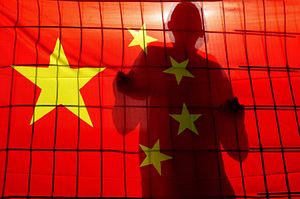China’s sensitivity to outside commentary on its policies in Xinjiang is nothing new. However, Beijing’s latest line on the region and its reactions to international condemnation of its treatment of Uyghurs appear to strike decidedly contrary messages. On opposite ends of the messaging spectrum: a state-backed musical set in Xinjiang debuting in late March pushing the region as a utopia of ethnic unity, and a Chinese court this week giving death sentences to two Uyghur former government officials for engaging in “separatist activities.”
Shirzat Bawudun, a former head of the Xinjiang department of justice, was found to have conspired with a terrorist organization (the East Turkestan Islamic Movement), taken bribes, and illegally provided “information to foreign forces.” Sattar Sawut, a former director of the Xinjiang education department, was found guilty of incorporating ethnic separatism, violence, terrorism, and religious extremism content into Uyghur language textbooks. (Many of those recruited by Chen Quanguo, the Communist Party secretary of the autonomous region, to help carry out a “smashing, obliterating offensive” against terrorism, were themselves from the targeted ethnic group.)
External pressure on China has ramped up in 2021, with legislatures and businesses in developed countries taking steps in a bid to hold Beijing accountable. Last month, Canada, the European Union, the United Kingdom, and the United States imposed coordinated sanctions over atrocities in Xinjiang. (The EU’s sanctions against China were its first punitive measures taken against Beijing over human rights issues since the crackdown against civilians at Tiananmen Square in 1989.)
Unsurprisingly, China struck back with its own measures. While the Western sanctions aimed at Chinese officials, however, China’s response targeted both politicians and researchers, demonstrating that it had no tolerance for what is deemed “disinformation” about China. This subsequent escalation prompted the drafting of a solidarity statement signed by more than 1,150 scholars and researchers from around the world condemning the retaliation as part of a broader process to constrain and control academic debate on China-related research.
With political tensions on the rise, leadership in Beijing is leaning into its tough talk. When it comes to Xinjiang, Beijing’s sensitivity is heightened to any questions about its authority and legitimacy. Lately, this has led to some bold whataboutism. In addition to releasing a report on the United States’ human rights record in 2020, Chinese Foreign Ministry Spokesperson Zhao Lijian said the United States was “flagrantly playing with double standard and using human rights as a tool to maintain its hegemony.” In response to the U.S. labeling Beijing’s policies in Xinjiang as tantamount to “genocide,” Zhao accused the United States of committing five sins related to human rights: colonialism, racism, exporting unrest, interference in domestic affairs, and using double standards, adding that Muslims in the United States also face discrimination.
But even while pushing a hard line, Beijing also appears to be activating a softer rhetorical campaign to rescript the Xinjiang narrative. The musical drama “The Wings of Song” tells the story of three men from different ethnic groups – a Han Chinese, a Uyghur, and a Kazakh – who together seek to make their musical dreams a reality. The film presents a highly stylized image ethnic harmony set against Xinjiang’s idyllic landscape – but one in which cultural and religious markers such as language and head scarves have been scrubbed out.
While this “La La Land” with Chinese characteristics may come off as tone deaf, it falls in line with presentations that Chinese diplomats have been making in recent weeks. This week, the Chinese ambassador to Australia held a rare press conference and introduced officials video conferencing from Xinjiang under a “Xinjiang is a Wonderful Land” banner. The overarching theme conveyed: Xinjiang is a region characterized by “religious harmony” and development and prosperity, reaping the rewards of policies China’s enacted in the name of counterterrorism and de-radicalization.
It is important to note that the central government may be seeking to dispatch different messages to different audiences, including the domestic Chinese population, the Chinese diaspora abroad, as well as disparate international audiences.
China’s now notorious “wolf warrior diplomacy” may not be just intended to signal strength to an increasingly nationalistic Chinese populace. Alex Dukalskis, an associate professor at University College Dublin in the School of Politics and International Relations, suggested that this strident tone from an ever-more global China likely speaks to a mixture of groups including the Chinese elite and the increasingly nationalistic public; non-Western audiences (to demonstrate China’s leadership in standing up to the West); and elite Western audiences (to “signal punishment for stepping out of line”).
Nevertheless, managing this kind of messaging can be messy business and may not always hit its mark. The content of Beijing’s Xinjiang narrative may hold across both the harder and softer lines, but the use of two opposing tones suggests an effort by Beijing to experiment how best to push back rhetorically, especially as talk of boycotting Beijing’s 2022 Winter Olympic Games continue.

































